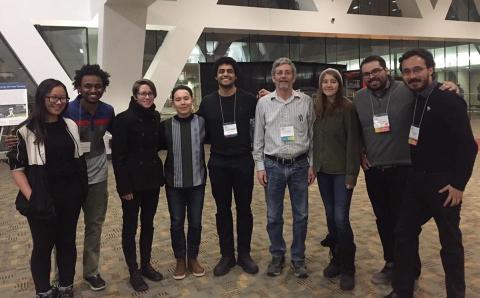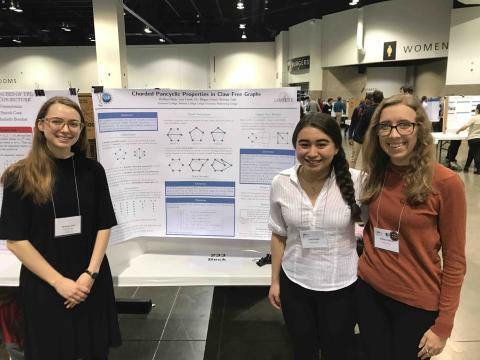
Mathematics and statistics conferences can be a great experience and provide opportunities to present research you've worked on and to learn more about careers and the broader community in math and stats. There are many different types of conferences at the local, regional, and national levels. They may focus on undergraduate research, specific areas of research, or be large general meetings with a big mix of events. Keep an eye out for emailed announcements, or ask a professor for information about conferences that you could attend or present at, such as the WIMIN conference at Smith in early fall, the Hudson River Undergraduate Math Conference in the spring, the Joint Math Meetings in early January, and MathFest and the Joint Statistical Meetings in the summer. Another good conference to consider in the fall is the Field of Dreams conference aimed at supporting students from underrepresented groups, including minorities and first generation college students, to attend math grad school.
Cole Hawkins `16 on attending the 2017 Joint Mathematics Meetings:
From January 4th to January 6th I went to the Joint Mathematics Meetings (JMM) in Atlanta, Georgia. The main reason that I went was to present work that I’d started at an REU (Research Experience for Undergraduates) the summer before my senior year at Amherst. I continued that work as part of my senior thesis at Amherst. I also went to JMM because I’d had a great experience at the Joint Meetings in Statistics (JSM) the summer after my sophomore year, and I was hoping for a similar experience this time around.
JMM is usually advertised as the largest math conference in the world, and it’s massive. Tons of people attend. The majority of attendees are in academia, ranging from undergraduates to professors, but there are a few industry practitioners. There’s a ton of stuff to do. The main activities I took part in were presenting, attending talks, and wandering the exhibit hall.
Presenting is a lot of fun, and undergraduates are encouraged to present their work at the JMM poster session. This is an undergraduate-only session in which students present their posters to judges. That might sound a bit intimidating, but the judges are really friendly and encouraging. The poster session is also open to general public, also known as the other people at JMM. I was fortunate to also get invited to present at a session on undergraduate research opportunities in Commutative Algebra. This session highlighted potential topics for undergraduate research in the field by having undergrads and experts present. Presenting isn’t just fun, it’s great practice for an academic career, since poster presentations and talks happen all the time. Luckily the upper division math courses at Amherst do a great job preparing students to present, usually via final project presentations. Even if you’re not planning for a career as an academic mathematician, presenting to large groups is a great skill to pick up.

Whether or not you’re presenting, one of the best things about JMM is the incredible variety of research topics being presented. There are around 2000 talks in four days, and the talks cover an incredible breadth of fields. Planning ahead on which talks to attend is really important. A lot of these talks are for a relatively advanced audience. In fact, most theoretical talks will have a starting point beyond the material required in the standard undergraduate sequence at Amherst. That can make picking talks to attend a bit tricky for an undergraduate or early graduate student. Ideally, you’ll find talks that push you a bit, but build off material that’s somewhat familiar. It’s often a great experience to attend a talk that’s a bit beyond your current knowledge. It can help place your knowledge in context, and give you a new topic to explore. If no student ever attended a math talk they weren’t completely sure that they’d understand, students would never attend math talks. Attending research talks on material that you’re interested in is a wonderful way to learn more about the topic and get an overview of some problems in the field before diving in. Also, getting a chance to hear from an expert can illuminating, since they can do an excellent job of laying out motivations and putting ideas in context. Taking some graduate level courses at Amherst or UMass will help get you to an appropriate level, and is always a great idea. With all that said, trying to attend three days worth of talks in Commutative Algebra might be a challenge even for someone who’s specialized in that field. I’ve found that mixing in a variety of talks keeps me feeling relatively fresh.
There are a number of “student-friendly” talks and activities that go on at JMM. First, there’s usually a set of talks on the History of Mathematics. These talks are pretty interesting, and give you an easy way to change things up. My background is in pure mathematics, but I really enjoy talks on biomath. I might not follow an entire talk, but the problem statement is often really interesting and understandable, and that helps draw my attention. Also a decent number of sessions highlight undergraduate contributions, and those sessions are a great fit for non-specialists, including undergraduate students.
Finally, if you ever get tired of doing math (imagine that), there’s a lot going on that’s less intellectually demanding. The Exhibit Hall has companies or programs that advertise in booths. This is mostly a good place to collect an absurd number of logoed writing implements. The Exhibit Hall also gives you a chance to talk to program representatives, both graduate and undergraduate (i.e. Budapest Semester in Mathematics), or talk to potential employers. Both groups are happy to tell you about their institutions, and they often have interesting things to say.
One important question is: Who pays for all of this? That depends on a lot of things. Having research to present at the undergraduate poster session is a great way to get some funding, and Amherst has a variety of funding sources that you might be eligible for. Talking to your professors about this is definitely the way to go. They’ll know where to direct you.
Attending a conference is a great chance to practice presenting your work and to see some non-Amherst mathematicians in action. It gives you the opportunity to get a sense of what the mathematical research community is like.